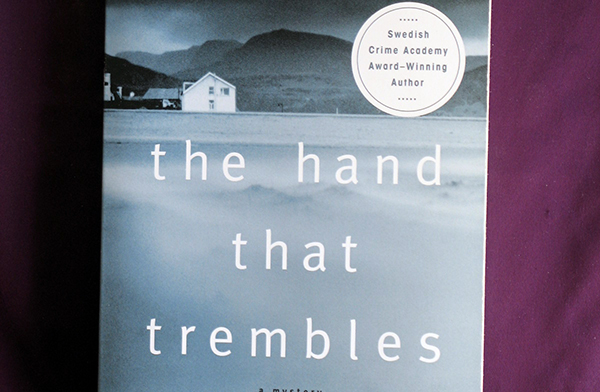Home »

An interesting novel with far-reaching overtones
Book Review
By Derryll White
Eriksson, Kjell (2011). The Hand That Trembles.
This novel begins in 1956 in a Swedish woodshed. The reader should understand that even today wood and the woodshed are an integral part of Swedish life. Each morning, early, men are out sawing and splitting wood in preparation for the coming winter which is never far from the Swedish mind.
 ‘The Hand That Trembles’ draws the reader in quickly, with an older uncle sharing memories with his young nephew. The discussion is fragmented, as memories usually are, but ends with a perceptive “Nothing is forever” from the uncle. Fifty-five years later Swedes still mull over WW II as if it occurred last year, still explain their present economy and culture in the light of it.
‘The Hand That Trembles’ draws the reader in quickly, with an older uncle sharing memories with his young nephew. The discussion is fragmented, as memories usually are, but ends with a perceptive “Nothing is forever” from the uncle. Fifty-five years later Swedes still mull over WW II as if it occurred last year, still explain their present economy and culture in the light of it.
The novel then jumps to 1993. Eriksson is careful to give his readers a grounding in the political realities of Sweden, laying out a class consciousness seldom recognized or understood in North America. He does it well, honouring both linguistic and geographic division in what we generically see as ‘Sweden.’ He builds a picture of social democracy that is still tangible in today’s Sweden, although it is now fading under the pressures of global capitalism. Eriksson’s thoughts dovetail with other Swedish writers such as Henning Mankell, both sounding an alarm for what the Swedish state and the Swedish people are losing. It is good for Canadians, who Swedes see as much like themselves in terms of social investment, to read Eriksson and contemplate on what is occurring in our own country.
I like the way Eriksson digs at the secret passion of Swedes. They consider themselves a northern people and, like Canadians, are always dreaming of escaping the snow and cold. They have a passion for Thailand and the Gambia in Africa, and it isn’t just the desire for sexual gratification. Swedes long to move south – southern France, Spain and Italy – in the same way that Canadian snowbirds occupy Florida and Arizona. Eriksson does not hesitate to pick at that sore in the Swedish psyche. He leaves little as sacred.
There is considerable thought given here of a time gone by; of Sweden emerging from World War II. The war contains a series of events that have combined to shape the present Swedish state and its citizens. Eriksson works this ground effectively and in an interesting manner, never becoming pedantic or bound by rigid fact. Rather, he chases that common feeling of what Sweden is as a social democratic state, and what it could be.
‘The Hand That Trembles’ is unlike North American mysteries. It is a novel with far-reaching overtones and with direct social and political meaning for Canadians. I really enjoyed this book.
********
Excerpts from the novel:
LOVE – “You see, we just run after material things,” she said, and let her gaze sweep over the room. “It would be so liberating if someone gave way to their heart. I can see him there in the garden, going about his trivial tasks, but in his heart of hearts so very happy.”
CAPITALISM – “Haven’t you seen the industrial complexes? All these call centers and corporate parks. Not to mention all the hideous shopping malls springing up like mushrooms.”
“It certainly creates jobs,” he objected.
Billstrom snorted.
“Impoverishment,” she said curtly, standing up abruptly and touching his shoulder before she left.
ILLNESS – …he was afraid. Afraid to grow old, afraid to die. Afraid not to be counted among the active and living, those who meant something.
CHANGE – “Was he sick?”
“No, superfluous maybe. He drove a beverage truck and became superfluous. He missed the boxes, the clatter of glass, and talking with the store owners and the kiosk keepers.”
“Superfluous,” Berglund said.
“That’s how he felt.”
RELIGION – His God no longer existed. Lindell was not a believer, had never been, but found it sloppy and unfair to treat one’s faith in this way. If it could not stand up to an illness, it was not worth much.
LOVE – He wanted love, but no longer believed himself capable of receiving it, and definitely not giving it.
CAPITALISM – For his overall impression of Bangalore was chaos. The new technology that was to revolutionize and improve life, speed up communications between people and continents, had a back side that appeared in a clearer light. He had sensed this before, all puffed-up successes in the IT industry, all castles in the sky that had been built up and collapsed, and then the short memories of people as new bubbles were blown up.
CLASS – He was a man whose justification lay in his story, in the trade he plied and in the language that he spoke. She believed that her education and her future role as university instructor both attracted and frightened him. None of his co-workers was married to an academic.
SWEDES, ANOTHER VIEW – All of these damned Swede-bastards who devoured all the shit, hair and all, wallowing in the mass media’s garbage. They consumed the rating headlines with a ravenous appetite, as if they were delicacies, and slurped up the offerings of retarded hoaxers as if they came from the king himself.
POLITICIANS – …he was right when he thundered about corrupt politicians bought by the capitalists….
ATTENTION – Trees remember. They sighed contentedly once in place, Sven-Arne Persson was convinced of that. It was the memory that allowed them to grow.
HISTORY – …it struck her that she – if she had the talent – would have been able to write the story of Sweden. Most of the people she encountered in her work were actually innocent, and even the guilty ones, the murderers and rapists, the manslaughterers, the thieves and dealers, were all part of the story.
The sniper’s story is no worse than the hunting master’s.
BELIEF – “He became a politician and that might have been all right but he didn’t believe in it, and that’s bad. I mean, here, on the inside,” he said and thumped above his heart. “In here. There has to be a red thread one follows in life.”
SEXUALITY – How long since she had gone to bed with a man? She did not want to count the months, or rather, years. She was drying up. Her desire came and went, her dreams of intimacy likewise. Sometimes a great longing came over her but her mechanisms to keep loneliness at bay were so entrenched and refined that she rarely felt the bottomless despair that used to plague her.
MEN – “Haven’t you noticed? When they are like males in rut, they stink, but when they are satisfied the smell is not as sharp.”
SWEDES – She liked the atmosphere there, which was almost continental, and she could convince herself they were many miles away, somewhere in southern Europe.
ART – “I reproduce nature, create small representations of birds, flowers, and animals. I don’t dare try humans. There I can’t measure myself against Watanabe. I do it with love, become drunk with the minute. A pinecone can make me smile.”
ENVIRONMENT – “What do you see when you look out over the world?”….
“War,” Lisen Morell said finally. “War against all that is living.”
MEN – “…but if you live with a man the question of children always comes up in the end. To deny a man children is to deny him, isn’t it? A man can’t take that. It upsets him. The male wants to reproduce himself, sire offspring. It is the proof of his virility.”
THAILAND – Thailand let its young women go to humiliation and death. Sure Stolt hated the Scandinavians, British, and Germans, the old men, the gang of rowdy twenty-year-old men, the pudgy pale middle-aged men, and the well-established ones with gold clubs in their luggage. All came for the sake of flesh.
MEMORY – He walked without thinking of anything except the connections that each object that appeared before him told. Everything was connected, had a story, talked to him about a time gone by. It was like a museum of memories.
 – Derryll White once wrote books but now chooses to read and write about them. When not reading he writes history for the web at www.basininstitute.org.
– Derryll White once wrote books but now chooses to read and write about them. When not reading he writes history for the web at www.basininstitute.org.







